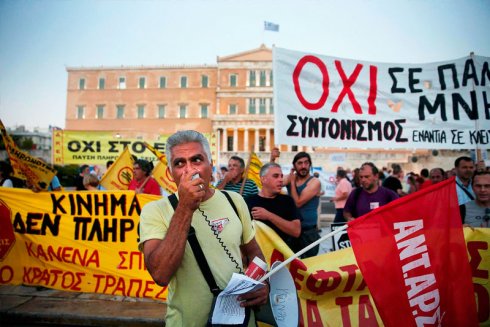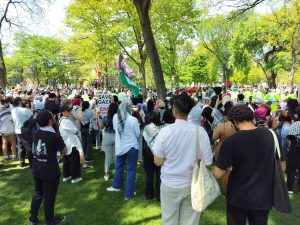We met them on two different occasions, but their stories were marked by the same state of mind: anger, doubt, and a strong desire to tell what has happened in Greece in the past few weeks. That is why we have decided to share what their stories reflected in a single article. All three see the need to continue the struggle after the summer’s end.
We asked them how they experienced their activism during the week leading up to the referendum…
Mirto: That week was very intense, very combative, very energized. Most people believed at the beginning that we were going to lose because what we saw in the news, in the press or on TV, was terrible, there was a lot of fear. It was terrorism: they were saying that the “OXI” vote meant a “Grexit”, staying “outside of the euro”. Futhermore, capital controls had been imposed and the whole situation made us think that the “NAI” (yes) was going to win. Demonstrations were organized by the supporters of the NAI vote; their slogan was “We live in Europe…”… The week of the referendum, there were demonstrations for the NO and the YES on the same day, but in different places. At the demonstration for the YES, there was a fair amount of people, but not too many. By contrast, at the Syntagma Square, the demonstration for the NO was enormous with huge crowds. And not only activists or left-wing militants. The residents of Athens were there, too, to support the NO. After all that, we began to believe that the NO was possible.
In the discussion with Dimitris, member of the bookshop workers union, we asked him what was his union’s position on the referendum…
Dimitris: We published a public declaration in which we affirmed that our NO was a working-class non and that the working class had to express itself. People were talking about the referendum and the NO everywhere, in the city’s coffee shops, in popular neighborhoods, in the workplace, while waiting for the bus or metro.
In the days leading up the referendum, an extreme social polarization manifested itself in a climate of tense political discussion. Thanasis told us that in the workplace, everyone was debating and the different positions were being confronted. The bosses were for the YES and were saying that if the NO won, they were going to close up shop. In face, they told us that many workers who campaigned for the NO, are today persecuted by their bosses and threatened with unemployment.
We asked them what the popular NO vote meant for them, considering that its meaning was contested from the very beginning and the ambigous manner that the referendum was called for by the government…
Dimitris: Lots of people were saying that there was much support for the No, and that was the truth. But I believe that the NO was mostly a “NO to austerity and the memorandums”. I believe that the NO also meant a NO to the governments and political system that has organized and is still organizing the politics of austerity. For me personnally, it was also a NO to capitalism, but that was my own NO. It is difficult to know if most people who voted NO wanted to leave the Euruopean Union, but I believe that a substantial part, at least, was thinking about it. That is why this sector of the NO vote was so outraged when Tsipras announced his intention to negociate.
During the interview with Mirto, she told us that “there was a probleme with the NO and the YES. Everyone saw in the NO and the YES what he wanted. And it was a real problem. It was easy for them to say that NO meant a “Grexit” and that YES meant “supporting Europe”, or that “we want Greece to stay in the EU”, and all that jazz. The NO didn’t mean, however, that we all wanted a Grexit.”
On the other hand, we wanted to know how people perceived Tsipras’ attitude when he announced that he was going to continue negociations with the Troika in order to get a “better agreement”.
Thanasis: Personally, I thought that Tsipras wanted to resign, leave the problem to someone else. If the result had been 51% to 49%, he could have said something like “I did everything within my power, but the majority does not want to go any further, so I cannot continue on…” But the very opposite happened. During the July 3rd demonstration, it was clear that what people were chanting was totally different from what Tsipras was saying in his public speeches… They were chanting very aggressive things against the Troika and even sometimes against capitalism itself.
Mirto: I do not know if Tsipras wanted to leave the government, but what is clear, is that after the NO, with such a strong victory, Tsipras used it in a completely contradictory manner than what we (including members of Syriza) were all expecting. What he was saying was so different from what we were waiting for that a joke began to go around, something like “the Tsipras who came back from Brussels is a clone”, that they had to have done something to him during his stay because he had agreed to something so different from the mandate that the people had given him… At first, I thought he wanted to negociate from a stronger position. But in the following days, we saw that the agreement was even worse.
The discussion naturally turned to how Tsipras’ capitulation was experienced…
Mirto: We were dumbfounded, abashed. Most people hoped that he was at least going to negociate a better plan, but no, it was Juncker’s plan. For six months, we negociated in Brussells, and nothing was done here in Greece, they passed no legislation…
Thanasis: For example, concerning human rights, or the police, that is full of fascistes, there are big problems here, but they did nothing… They kept saying that we must wait because they were negociating with the Troika and that was the most urgent. Well, they can no longer do anything because they negociated, and now they have their feet and hands tied and cannot even pass legislation without the Troika’s permission.
Mirto: The government says the third “bailout” is better than the other two because the VAT will only be increased from 13% to 23%, while the others reduced wages by 40%… That’s why it is supposedly better than the other two…
In the different interviews, we asked them if they believed that Tsipras’ rapid capitulation had opened up a new experience for segments of the vanguard…
Dimitris : With the worsening of the crisis, there is a break with illusions that existed concerning the European Union. Syriza affirmed from the very beginning that it was against austerity, but wanted Greece to stay in the European Union. Now, we can see that this is impossible. Even if lots of people still support Tsipras, I believe that less and less people have illusions with the European Union.
Mirto: I believe that the “bailout” like the “Grexit”, which is the current situation, are two very bad options. Because a Grexit, according to those who want it, is also very bad, it is not a solution for working people. They wanted to suffocate this people until the end of time because they wanted to do something else, and went against big capital. That is my impression.
Thanasis: Many people now believe that we want to leave the European Union, but they say that we cannot because Greece is too small a country and that other countries, especially Germany, will squash us.
Mirto: When Tsipras was elected, he said that his government would be the first to implement everything it had promised during its campaign. What did it really do? It did something worse than New Democracy, which it strongly criticized while in the opposition. It said that we were being blackmailed, and I do believe that that was the case, but the problem is knowing how we got into this situation in the first place.
With Dimitris, we talked about the July 15 demonstration, the day that the Greek Parliament was going to vote on the agreement. On that day, 54 demonstrators were arrested, 14 were prosecuted and 3 were finally sentenced to prison with suspended sentences- that can become effective at any time. Dimitris was a witness for charged activists during the trial and told us: “We participated in the demonstration as a union and we made a public declaration calling all workers to participe as well. The crowd was rather big, and the police began to repress us with a lot of violence, they gassed us, and arrested our comrades who were immediately charged. Among them was the general secretary of our union. We campaigned for his liberation and I was personally a witness during the trial. The trial ended with the condamnation of three demonstrators without no reason and no proof. A demonstrator of Albanian origins was the most severely punished, a double attack for being an immigrant. He will most likely have difficulties renewing his residency permit and staying in Greece, and he has lived here for three years! In Greece, we inherited a judicial system and a police force from the dictatorship, meaning they are all corrupt.”
To conclude, these combative activists shared with us the perspectives they see in the situation…
Thanasis: There is a major problem because Syriza was the incarnation of the illusions of many popular movements and now many people, as combative as they may be, feel lost, disheartened…
Mirto: There is a feeling of betrayal, of disillusionment… But in October, when austerity measures begin to make themselves felt, I believe we are going to see more struggles. But I believe that for things to really change, these struggles will have to be very strong. The situation remains, however, open, and that is why there is always hope for something different to happen. What they want to do is terrible, they want to privatize everything, sell everything, they want to sell everything, including the islands, the Acropolis…
After these interviews, we count on staying in contact with these activists. Surely, in the coming months, you will hear the voices of Thansis, Dimitris, and Mirto once again on Left Voice, as the protagonists of new struggles in this tumoutulous Greece, against the projects of the Syriza government and the Troika.
Translation: Ivan Matewan











